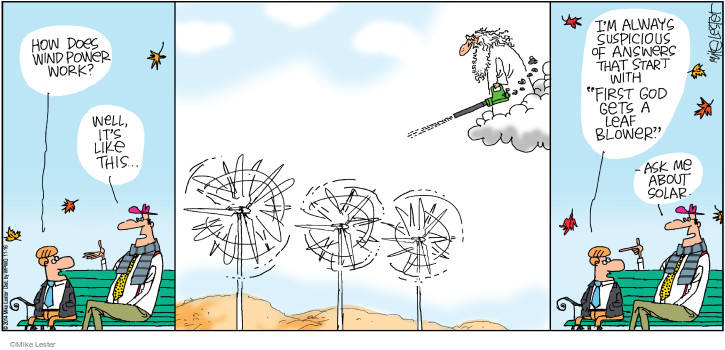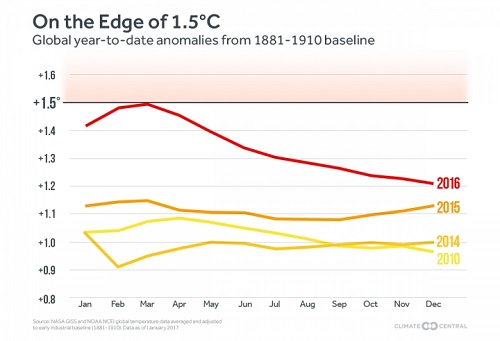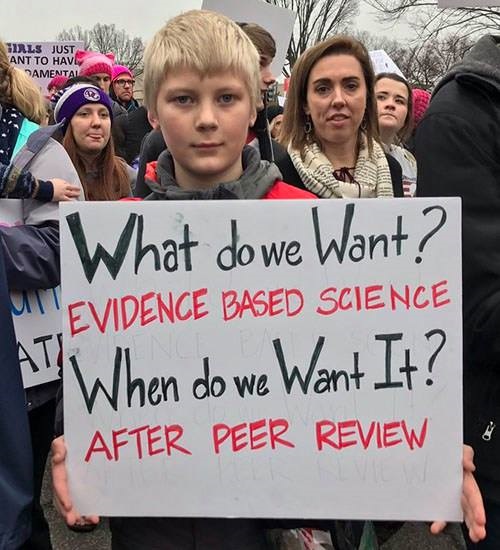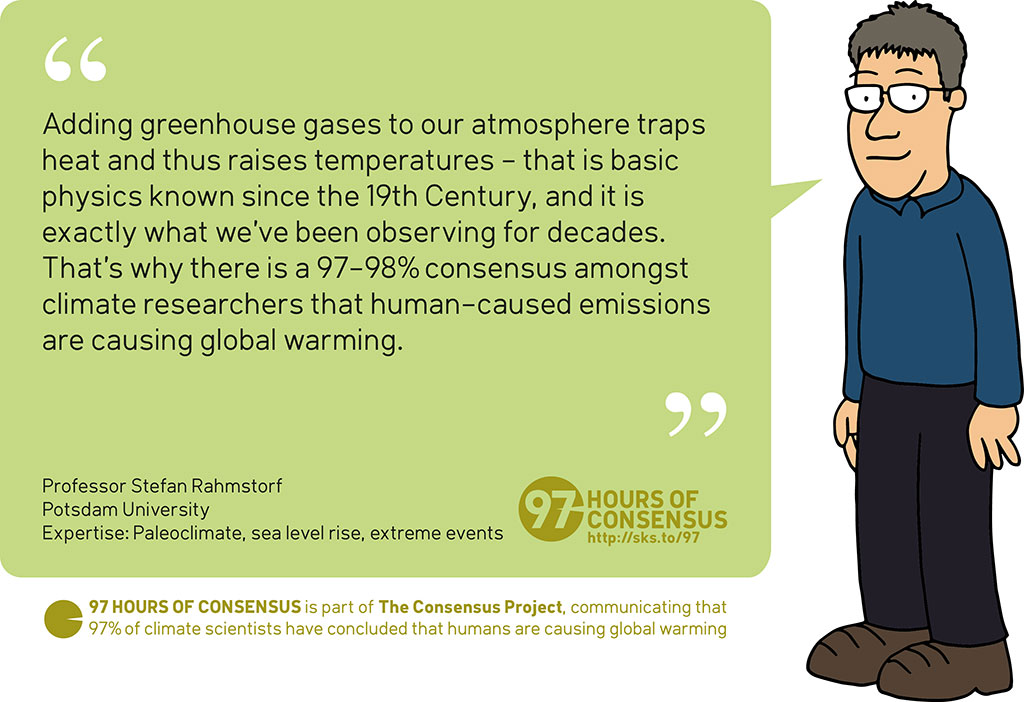2017 SkS Weekly Climate Change & Global Warming Digest #3
Posted on 22 January 2017 by John Hartz
Story of the Week... Toon of the Week... Quote of the Week... Graphic of the Week... SkS Spotlights... Video of the Week... Coming Soon on SkS... Poster of the Week... Climate Feedback Reviews... SkS Week in Review... 97 Hours of Consensus...
Story of the Week...
Scientists caution that a four- or eight-year delay in reducing greenhouse gas emissions could lead to dangerously higher global temperatures and long-term adverse impacts. (See article and Q&A with scientist Ben Sanderson)
Precisely how the incoming Trump administration will deal with climate change remains uncertain. But Donald Trump’s statements during the campaign and since his election – and also his Cabinet nominations and his immediately purging the whitehouse.gov website of climate science information – signal, at a minimum, that he will not make addressing climate change a priority.

And that the administration likely will move to shelve federal government mitigation efforts.
Throughout his campaign and during the transition leading up to his January 20th inauguration, Trump frequently had been dismissive of the science and bullish on coal and fossil fuels generally. Proponents for aggressive action and many in the climate science research community have expressed increasing concerns.
In recent months, two climate modelers – Ben Sanderson, of the National Center for Atmospheric Research, in Boulder, Colorado, and Reto Knutti of ETH Zurich, Switzerland – examined how Trump administration inaction and actions might influence future planetary warming. They concluded that a four- or eight-year delay in mitigation could lead to substantially exceeding global temperature limits for dangerous levels of emissions and concentrations, perhaps indefinitely.
Two scientists' concerns over years of climate inaction by Daniel Grossman & Bud Ward, Yale Climate Communications, Jan 21, 2017
Toon of the Week...

Quote of the Week...
“We have clearly passed 1 degree above preindustrial temperatures,” and likely won’t go below it without a major volcanic eruption (which tends to cool global temperatures), Gavin Schmidt, director of NASA’s Goddard Institute for Space Studies, said.
When we might actually reach 1.5°C isn’t clear, Schmidt said, and depends both on how quickly greenhouse gases are emitted — which depends on how quickly countries act to limit their emissions — and just how much additional carbon dioxide can be emitted before the 1.5°C goal is breached, which is still somewhat uncertain.
“We’re closer than we would like to be,” he said.
With El Niño gone, and a weak La Niña to start off 2017, this year isn’t likely to continue the streak and best 2016, climate scientists say. But even if 2017 is cooler than 2016, it will only be a very slight dip compared to the long-term warming trend — in fact, the U.K. Met Office expects that 2017 will still rank among the hottest years on record.
“It’s still going to be a top 5 year in our analysis. I’m pretty confident about that,” Schmidt said.
2016 Officially Declared Hottest Year on Record by Andrea Thompson, ClimateCentral, Jan 18, 2017
Graphic of the Week...

The running average of global temperatures throughout 2016 compared to recent years.
2016 Officially Declared Hottest Year on Record by Andrea Thompson, ClimateCentral, Jan 18, 2017
SkS Spotlights...

Alliance for Climate Education (ACE)
ACE's mission is to educate young people on the science of climate change and empower them to take action. By empowering youth to take action within a frame of justice and optimism, we are shifting the national discourse on climate in ways that are proven to affect public opinion and policy.
ACE does two things best.
First, we teach climate science that puts teenagers at the center of the story. Our live, in-school assembly is award-winning and proven to work.
Second, we give every student a chance to take action. For some, it’s a small lifestyle change. For others, it’s hands-on preparation for a lifetime of leadership.
Video of the Week...
Jeff Goodell on Miami Flooding by Peter Scinclair, Climate Crock of the Week, Jan 21, 2017
Coming Soon on SkS...
- We're breaking Earth's temperature record every three years (Dana)
- Joint Statements on Climate Change from National Academies of Science Around the World (Peter Gleick)
- Guest Post (John Abraham)
- From the eMail Bag: Abrupt Climate Change in Greenland's Past: Global or Local? (David Kirtley)
- Fact Check: Trump's Cabinet Nominees on Human-Caused Global Warming (Dana)
- 2017 SkS Weekly Climate Change & Global Warming News Roundup #4 (John Hartz)
- 2017 SkS Weekly Climate Change & Global Waming Digest #4 (John Hartz)
Poster of the Week...

Signs of the Times by Peter Scinclair, Climate Crock of the Week, Jan 22, 2017
Climate Feedback Reviews...
Climate Feedback asked its network of scientists to review the article, U.S. scientists officially declare 2016 the hottest year on record. That makes three in a row. by Chris Mooney, Energy & Environment, Washington Post, Jan 18, 2017
Five scientists analyzed the article and estimated its overall scientific credibility to be ‘high’.
Click here to access the detailed review.
SkS Week in Review...
- 2017 SkS Weekly Climate Change & Global Warming News Roundup #3 by John Hartz
- John Cook: Opportunity or “New Dark Age of Denial” by greeman3610
- So what did-in the dinosaurs? An update. by Howard Lee
- Video: NASA’s Dr Gavin Schmidt on 2016 as the hottest year on record by Roz Pidcock (Carbon Brief)
- Parts of United States are heating faster than globe as a whole by John Abraham (Climate Consensus - the 97%, Guardian)
- Fact Check: Rex Tillerson on Climate Risks by Dana Nuccitelli (Climate Consensus - the 97%, Guardian)
- 2017 SkS Weekly Climate Change & Global Warming Digest #2 by John Hartz
97 Hours of Consensus...

Quote provided via email































 Arguments
Arguments






























I have to freely confess that I don't really get the "Graphic of the Week".
It seems to show temperature curves throughout consecutive years from Jan to Dec. But how can the end of, say, the 2015 curve in Dec 2015 be about 0.3° (or so) lower than the start of the 2016 curve in Jan 2016?
ajki @1, the graph shows "year-to-date anomalies". That is, in January it shows the average anomaly of all months up to January (ie, the January anomaly). In February it shows the average up to February (ie, the average of January and February). And so on.
If you look at 2015, it started moderately warm (about 1.12 C). It then warmed for three months (ie, each successive month was slightly warmer than the average of the preceding months). It then cooled for 6 months (each successive month was cooler than the average of the preceding months), then warmed over the remainder of the year. That means it finished hot, just as 2016 started hot, even though its final value (the average for the year) was not very hot relative to 2016 because of the cooler months in the middle of 2015.
All temperature qualifiers are relative to the last few years. Of course they all have been very hot relative to the early twentieth century, or even relative to most years in the late twentieth century.
The Graphic of the Week appears to be a "Cherry-picked" way of analysing and presenting the data. It seems to have been done in order to claim the warming has just about reached 1.5 C. That is unnecessarily Alarmist.
I struggle to see a scientific reason for evaluating the temperatures the way they have been evaluated.
However, I also consider it far more meaningful to present a graph of a running 10 year average (a new point for each new month, not even having to wait for a calendar year to end) than showing straight lines of the average over each Decade. The use of the 10 year bar leads to arguments that we need to wait for the next 10 years of data to be collected before anything can be concluded.
I also think that a running 12 month average is also a more meaningful presentation of what is going on than waiting until the December numbers are in to declare how much warmer a 12 month period has been.
I would think that a clearer and more comprehensive presentation would be the running 12-month average through the past 137 years of data. It would highlight what needs to be highlighted about how warm the planet is becoming even though the maximum value would not have been as close to 1.5 C. And lines for the running 10-year average and 30-year average should also be shown to highlight the trend of the temperatures.
And the same should be done for the satellite data. The 9 year length of the 30 year average in the satellite data would be good for people to see, because though it is short it is undeniably climbing. And it would raise the valid question of why the likes of Dr. Roy Spencer prefer to show a 13 month average on the satellite data.
One thing I like about the 30 year average in the surface temperature data is there is a slight decline from about 1950 to the early 1960s (30 year averages ending in 1965 through the late 1970s). Seeing that slight decline helps understand why some people where thinking the planet was headed into cooling at a rate that may be beneficially moderated by increased levels of green house gas. It also shows that by 1980 such thinking was clearly no longer supported by the trend of the temperature data.
The Story of the Week is a comprehensive presentation of how damaging just one USA Presidential term of deliberate delay on climate action can be. However, the clear precedent for the concerns was not mentioned. The USA anti-Leadership of the Bush Administration on this matter is clearly a major reason the challenge today is so much larger.
During those 8 years some very smart people deliberately trying to get away with behaving as unacceptably as they could get away with. THeir actions had major impacts on the magnitude of the challenge being faced today. The developing nations were given plenty of good excuses to refuse to consider that they had any responsibility to commit to behaving better than the already developed nations, particularly the leadership of the USA, had behaved. It also derailed efforts by other developed nations that wanted to be more helpful, because being more helpful was clearly a global competitive disadvantage to the deliberate trouble-makers encouraged and excused by the likes of the Bush Administration.
Another point not clearly presented is that the added actions to try to mitigate the climate impacts are costs and challenges being imposed on future generations, other people. Many of the people benefiting from creating the future costs, and potentially insurmountable challenges of trying to correctly determine exactly how to adapt to the rapid climate changes in every region of the planet, will not suffer the consequences. Some of the most powerful people benefiting today likely only care about benefiting for a short period of time (maximizing their image and personal rate of return during their personal lifetime. They really do not care what people in the future think about them. Why should they?).
Particularly troubling are the statements that if things get built on the gamble that they will be gotten away with, they actually become activities that deserve protection. It is as if the investors who gambled on getting away with behaving unacceptably get protected from losing on their bad bets because of some implication that getting 'Leadership Permission' to go ahead somehow grants them immunity from personally losing Big Time when the unacceptability of what they is better understood.
Since the end of the 1980s it has been clear that every wealthy powerful person understood the unacceptability of already fortunate humans trying to get even more benefit from an activity like the global burning of fossil fuels. Only the less fortunate deserved an opportunity to benefit. And even their opportunity to benefit from burning fossil fuels would need to be limited. The exact global limit was not as clearly understood then, but the gist of it was undeniable.
I will present my perspective of the case of Alberta Bitumen Extraction (since it is what I am intimately familiar with, having lived here through those years). The understanding that there would be global limits on fossil fuel burning, and understanding that the less fortunate would be considered to be the only ones allowed to really benefit, was likely a major motivation for the Alberta efforts to rapidly accelerate the extraction of buried ancient hydorcarbons, particularly the massive amount of Bitumen in the sands of Northern Alberta. Those efforts included setting incredibly low Royalty rates and giving other incentives to get investors to bet on getting away with profiting from extraction of Alberta Bitumen. Future Albertans clearly could have gotten more value out of the buried ancient hydrocarbons but that was not a serious consideration. The key action was rapidly building a popular impression of economic activity that could be claimed to be deserving of protection and further growth. Don't all those people who have jobs deserve to continue doing what they were doing for as long as they can get away with? More importantly, don't the investors deserve to get their 'expected' return on their investment?
The expansion of the rate of extraction is now being claimed to be the reason that pipelines must be built. The threat is that if the new pipelines for the unjustifiably expanded, but 'permitted', operations are not allowed then that larger rate of extraction will be shipped in more damaging ways. And the Conservative Federal government deliberately weakened the permission process for pipelines, making it a quicker process and far more difficult for the unacceptable permission of such pursuits to be 'legally' blocked. And the regional popularity and profitability make it even more difficult to stop because 'why should anyone care about the future problems other people may face?'
A sad part is the recent claims of Alberta leadership on climate action. The claims being made are that by taking nominal action regarding CO2 emissions Alberta is granted social license and support for pipelines (or continuing to benefit from the extraction of the bitumen as long as can be gotten away with). It is sort of like claiming that since you properly stop at a stop sign you get the social licence to speed through playground zones, or from a business perspective if you donate to the Food Bank you can pollute the river. No amount of good action grants permission to behave less acceptably, yet popular opinion in Alberta (and outside of Alberta), clearly indicates those ways of thinking are indeed common, and many people actually consider such thinking to be sensible.
That is just the case of what happened in Alberta since the end of the 1980s. Many similarly damaging developments of undeserved perceptions of prosperity have been gotten away with. And it is undeniable that the Trump Administration will try to develop popular support for even more undeserved perceptions of prosperity.
Such actions are claimed to be the proper balancing of economic interests with other considerations. But they deliberately exclude future considerations or any considerations of unacceptability that clearly should Trump any “demand for balance'. The reality of what goes on was well presented in the 1987 UN commissioned report “Our Common Future”. That report made it clear that any reasonably aware wealthy powerful person no longer had any excuse to try to get away with benefiting from an activity that likely created problems for future generations. The following quote from that document states it undeniably:
“.25. Many present efforts to guard and maintain human progress, to meet human needs, and to realize human ambitions are simply unsustainable - in both the rich and poor nations. They draw too heavily, too quickly, on already overdrawn environmental resource accounts to be affordable far into the future without bankrupting those accounts. They may show profit on the balance sheets of our generation, but our children will inherit the losses. We borrow environmental capital from future generations with no intention or prospect of repaying. They may damn us for our spendthrift ways, but they can never collect on our debt to them. We act as we do because we can get away with it: future generations do not vote; they have no political or financial power; they cannot challenge our decisions.
26. But the results of the present profligacy are rapidly closing the options for future generations. Most of today's decision makers will be dead before the planet feels; the heavier effects of acid precipitation, global warming, ozone depletion, or widespread desertification and species loss. Most of the young voters of today will still be alive. In the Commission's hearings it was the young, those who have the most to lose, who were the harshest critics of the planet's present management.”
The future for life on this planet is clearly the responsibility of every generation of humanity. And every 'today' is the result of how responsible or irresponsible previous generations were. Real leaders understand their responsibility for the future. Many Winners like Trump care more about 'Appearing to Win any way they can get away with'. The USA is now clearly being governed by Winners for at least 2 years (the mid-term election could change control of the Senate, and maybe even the House). Hopefully the Winners who care less about the future will be encouraged to change their minds and becoming Responsible Leaders. If they don't then the future of humanity loses; It becomes more difficult for other Responsible Leaders to succeed if they have to compete with “People who don't care how they Win”.
Tom @2: When I look up some anomaly curves/data (e.g. on woodfortrees, gistmp LOTI), I can really see a massive "spike" within the timeframe 11/2015 and 02-03/2016 (the Nino peak, I assume). But the per-day values in this timeframe are sure connected (in the upward direction) - there isn't something like a sudden "step" from Dec 2015 to Jan 2016. This is a kind of representational flaw within the graph, which may lead (and sure led me) to a very high astonishment factor.
ajki: An explanation of how Climate Central computed the data used to create the Graphic of the Week is contained in its Research Report, Flirting with the 1.5°C Threshold, April 20, 2016.
The New York Times had an interesting article on climate change attitudes in Kansas. Farmers there all know that the climate is changing but it is politically incorrect to talk about it. They discusss the "strange weather" instead. From the article it appears that a completely different approach is needed to reach these very important people.
The Times says that some of the big agriculture enterprises are starting to raise climate change as an issue since it is obviously so important to farmers. The farmers are resistant to any discussion of the IPCC or the words "Climate Change". How can the data be reframed to reach these people? They know that they plant crops three weeks earlier than they did 30 years ago, it must be possible to get them on board. They know rain patterns have changed and more extreme weather is happening.
They do not want the government or environmentalists to tell them what to do. Perhaps working with the busines leaders would be a way to approach them. Their income stream is threatened by climate change. If the data were presented to them correctly they will take action to protect their future income.
michael sweet @8
I don't understand the need to persuade people of the reality of climate change, even if their livelihood depends on it. If they refuse to accept reality, let them suffer the consequences.
Digby Scorgie @9, because my children will also be adversly effected by those consequences. As will billions of others.
Digby Scorgie,
Farmers are a powerful lobbying force in the USA. Most farmers are rich businessmen. If they were serious about climate change their voice would be heard. Their failure is one of the major effects of climate change. Farmers keep long term weather records for their locations. They are aware of the changes climate change is causing for their businesses.
If farmers were to take a strong stand on AGW the Repubilcans would have to listen. The factor holding back their concern is completely political. If they can be reached it would comletely change the political debate. That change would benefit all of us (as Tom states).
Michael,
You are right that US farmers are businessmen. You are also right that farmers have pretty good long term records. You are right that farmers are aware of the impact climate change is causing their businesses. I never once met an American farmer who was an AGW denialist. And most American farmers are conservative Republicans too. Their influence is part of the reason for the "red state" heartland traditionally voting Republican.
So there is an opportunity with farmers to develop an AGW mitigation strategy that cooperates with the Republican party by including this demographic of Farmers and rural communities.
However, you will have to address a few things.
In 2012 the average age of farmers was 58.3 with over 20 times more farmers over age 75 as under 25. This has been growing steadily every year, as income:cost of living ratio has dropped. 52.2% of those farmers principle income off farm and only 46.1% of farmers with net positive income from farming. That means a full 63.9% of US farmers are operating at a loss and the only way they manage to avoid bankrupcy is off farm income. As if farming wasn't already a hard enough job!
Source: USDA-NASS, Census of Agriculture
This has caused a steady stream of farms to fail since 1970. In fact the financial stability of the small to medium family farm continues to decline, forcing 1/2 of the farmers in the whole country out of business and the remaining farms have doubled in size.
Also, Ag’s % GDP has fallen from 6.8% to .7% GDP. Available arable land has fallen from 189,244,000 hectares in 1969 to a minimum value of 151,669,300 in 2011 due to extensive land degradation and land use change. We are producing about 1 ton of food for every 100 tons of top soil lost. The % of the US publics food dollar that reaches the farmer is at an all time record low.
As razor thin as farm margins are, in order to effectively recruit this demographic you must first teach the farmer how to disconnect his operation from fossil fuel inputs. Right now lowering the price of oil can mean the difference between a profit and losing the farm.
It is one of the reasons for the huge push by the USDA NRCS & SARE to teach farmers how to wean themselves off Haber process nitrogen and mined phosphorus. A push that Trump right now has on hold with the gag order on the USDA! And worse, Trump appointed an industrial Ag guy.
Trump picks Sonny Perdue for agriculture secretary
So don't expect any improvement this 4 years. The fox is in charge of the hen house.
See the real power isn't really the farmers. They are between a rock and a hard place. The real power lies in the industrial giants supporting the farmers and taking that huge cut of the food dollar. As long as the US farmer is dependant on them, they really have no choice at all. And by themselves, there are far too few to worry about, and are typically safely ignored as a voting demographic. As long as the real power at the USDA is using the "mushroom" strategy, expect no help from farmers, no matter how scientifically and economically sound it might be.
Tom Curtis @10
My cheeky response is: "I have no children (phew!)." My serious response is that there is a problem only if those who suffer by ignoring climate change also cause others to suffer as a result. Does this really apply in the case of one group of one country's farmers?
michael sweet @11
See serious response above.
RedBaron @12
You put the problem in an entirely different light. As usual it's a lot more complicated than one might first think.